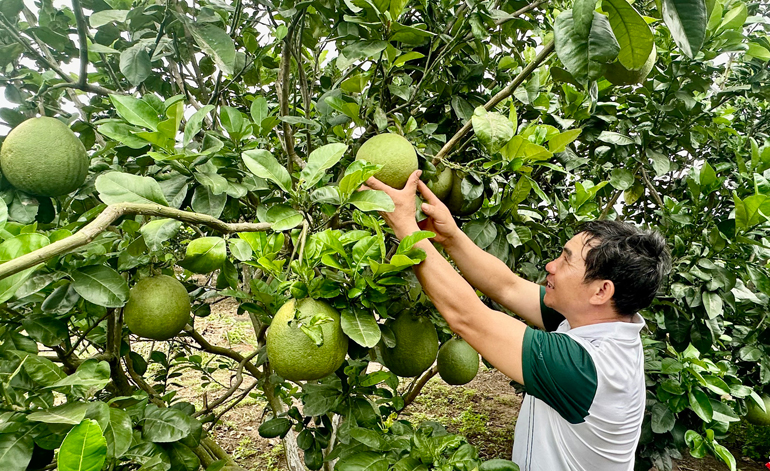 Green-skinned grapefruit is considered one of the potential OCOP fruit products of the mountainous district of Song Hinh. Photo: NGOC HAN
Green-skinned grapefruit is considered one of the potential OCOP fruit products of the mountainous district of Song Hinh. Photo: NGOC HAN The One Commune One Product program has awakened and promoted the strengths of mountainous regions , contributing to changing people 's production thinking . However , the advantages of mountainous regions are still in the form of potential .Efforts to implement and build According to the assessment from the Department of Agriculture and Rural Development, to achieve success in the One Commune One Product ( OCOP) Program, each district has had its own creative ways of doing things but all show high political determination, many suitable and practical solutions. In which, the key is to stimulate the potential for commodity production for products with strengths. Mr. Pham Dinh Phung, Vice Chairman of the People's Committee of Son Hoa district, said that with the goal of each commune having at least one OCOP product, the district is continuing to promote the implementation of this program. Accordingly, the locality organizes production associated with planning raw material areas based on advantages and natural conditions, culture, and customs of the people, developing and standardizing the strengths in the district's existing agricultural production. At the same time, focus on promoting trade and product promotion, creating conditions for entities to expand consumption markets and increase product value. According to Mr. Phung, the active and timely support of functional sectors and local authorities has motivated entities to boldly register to participate and constantly improve the quality and design of products. Up to now, the whole district has 34 OCOP products of 13 entities recognized as meeting 3-4 star OCOP standards. In particular, the main OCOP product of the district is sun-dried beef, with a variety of product processing forms such as: sun-dried beef in pieces, instant sun-dried beef in strips, smoked beef, shredded dried beef... In the mountainous district of Song Hinh, Ms. Ly Thi Thu Hang, Head of the Department of Agriculture and Rural Development of this district said: Closely following the natural conditions of each locality, the district has had specific directions in building typical agricultural raw material areas. The district has implemented scientific and technical training courses on cultivation and animal husbandry, providing knowledge and skills in investing in building OCOP products. The district also closely coordinates with relevant departments and branches to have a practical assessment and orientation to choose suitable products to build and classify products; at the same time, coordinate with consulting units to build profiles, support necessary funding to build OCOP products. Currently, the products classified as OCOP are all agricultural products with typical characteristics of Song Hinh such as: durian, green-skin grapefruit, macadamia nuts, longan, oranges, guava... In addition, in order for the district's agricultural products to reach far , from the stages of care, harvesting, processing, packaging to product preservation, all are strictly controlled by OCOP subjects , with barcodes to trace the origin. Many products have not been exploited It can be seen that OCOP products in the mountainous districts of the province all have their own unique features that other localities do not have. However, many advantageous products of mountainous areas have not been exploited and developed; Some products are still in the potential form. Mr. Tran Quoc Huy, Vice Chairman of Dong Xuan District People's Committee, said: Although communes and towns have many typical agricultural products, up to now, the whole district has only 5 products that have achieved OCOP. The reason is that some products have high economic value but it is difficult to expand the raw material area and production scale; most products are maintained at household scale, without close linkage in production and consumption. In addition, processing and preservation technology has not met the requirements, causing the potential products of the locality to be mainly seasonal, without large, continuous orders... According to Mr. Huy, for OCOP products of mountainous areas to develop sustainably and reach further is not an easy story. In the coming time, along with propaganda work, the district will increase the exploitation of key products, with strengths, products of craft villages and cooperatives; continue to implement support policies for entities with products participating in the OCOP Program. The district is also completing the evaluation dossier and will recognize at least 14 more OCOP products (green-skinned grapefruit, dung tea, brocade weaving, rice paper, coffee, etc.) by the end of this year. Mr. Nguyen Nhan, Chairman of the People's Committee of Xuan Phuoc Commune (Dong Xuan District) said: The commune always cares about and has support policies for entities with products participating in the OCOP Program. In addition to investing in upgrading recognized OCOP products, we also support the construction of production and product consumption linkage areas, helping to increase income for people. According to Mr. Ho Van Nhan, Deputy Chief of the Provincial New Rural Area Coordination Office, the biggest difficulty in building OCOP products in mountainous areas is the consumption market and brand building for the entities. Currently, the products are mainly consumed within the province and have not yet reached out to many other provinces. Meanwhile, to become an OCOP product, it is impossible to limit the scope of consumption to a locality. “To complete the OCOP Program’s goals in 2024, in which striving to have 2 products achieving 4-star OCOP, localities need to proactively coordinate with sectors, at the same time mobilize and integrate resources, arrange funding from local budgets, guide and support entities to build, prepare dossiers, and develop products that meet OCOP standards according to regulations. In addition, localities need to focus on promoting and mobilizing entities to focus on improving product quality, expanding production scale, and consumption markets so that OCOP products of this region are increasingly known to more people,” Mr. Nhan emphasized.
Vietnam.vn









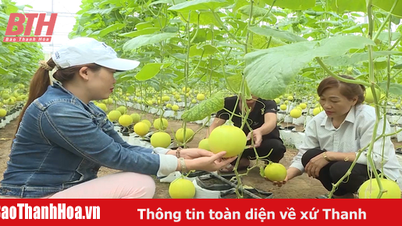


































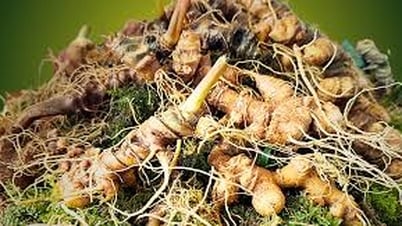
































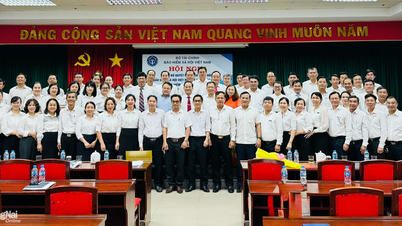











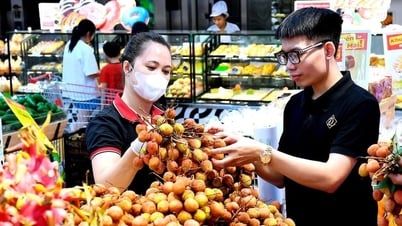










Comment (0)